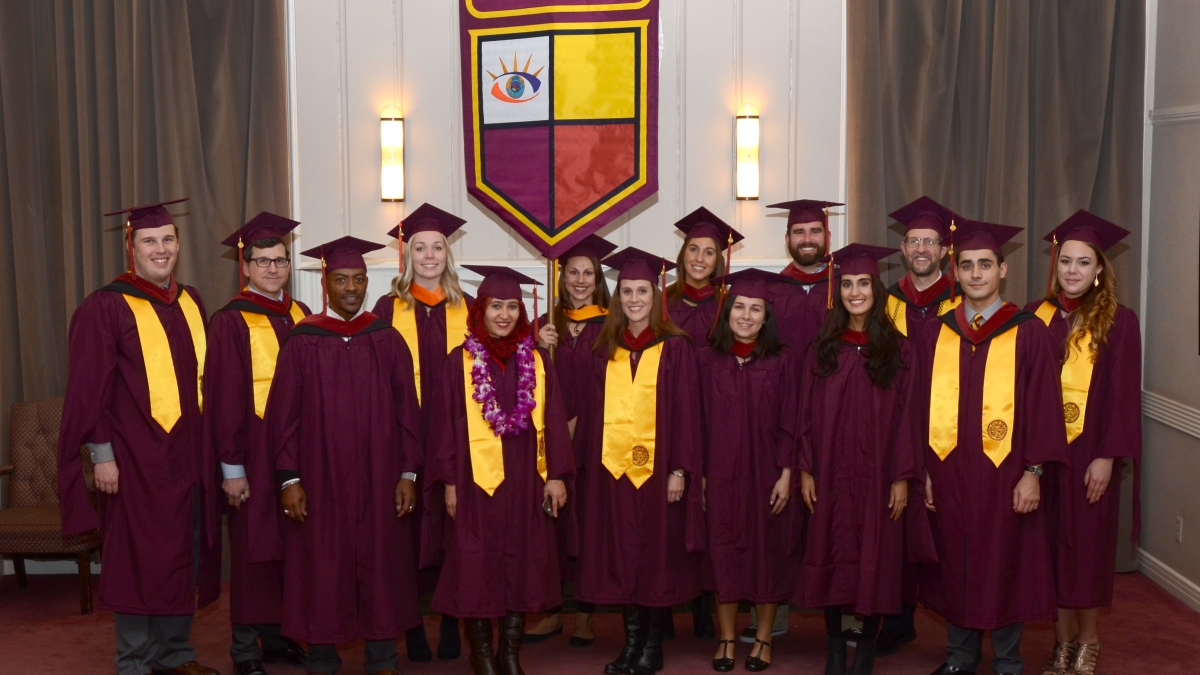ASU School for the Future of Innovation in Society holds inaugural convocation

Graduates at the first convocation of the School for the Future of Innovation in Society (from left): Jonathan Jacobson, Michael Hammett, Randall Lucas, Jordan Hibbs, Yasameen Sabera Aboozar, Chelsea Coyne Ritland, Allison Leach, Alexandra Nicodemo, Donna Abrantes, Silas Miers, Neekta Hamidi, Daniel Paul Moseke, Jacob D. McAuliffe, Jillian Forte.
The School for the Future of Innovation in Society celebrated its first cohort of graduates since becoming a new academic unit at Arizona State University in August. The school honored 26 graduates, 14 of which attended its inaugural convocation ceremony on Dec. 14.
Graduates of four of the school’s six graduate degree programs were hooded in the Lyceum Theater on the Tempe campus. The unique school grew from ASU’s Consortium for Science, Policy and Outcomes, which came to ASU in 2004 and is led by Daniel Sarewitz and co-director David Guston who became director of the school. The school’s focus of research is exploring how decisions made today about innovations can transform the world tomorrow. SFIS is planning to introduce an undergraduate program, including two majors, a minor and a certificate.
“SFIS (School for the Future of Innovation) is a school created from a problem in the world rather than from a centuries-old tradition of scholarship or the coalescing of a professional community. For us, that problem is the complex and sometimes ambiguous role of innovation in society, and the role that we all have in making our own futures,” Guston said.
The graduates were addressed by Tania Simoncelli, senior adviser to the director of the Broad Institute of Massachusetts Institute of Technology and Harvard University. Through her work challenging gene patents at the American Civil Liberties Union, as a top advisor at the Food and Drug Administration, and most recently as the leader of an initiative on forensic science at the Office of Science and Technology Policy, Simoncelli exemplifies the school's vision of scholars working to help solve real-world problems at the intersection of science, policy, and human well-being.
Michael Hammett, a graduate of the Global Technology and Development master’s program, was featured as the student speaker. “I would encourage incoming students to really savor the time spent in SFIS — it goes so fast! Explore beyond the textbooks and lectures and engage with your fellow students. The diverse student body in SFIS — made up of students from different cultures and age groups with a variety of career and life experiences — will offer a more well-rounded experience.”
Chelsea Coyne Ritland, also of the Global Technology and Development program, was chosen, as honor graduate and student marshal, to carry the school’s gonfalon in the university commencement earlier in the day. Jordan Hibbs, from the Master of Science and Technology Policy program, was selected to represent the school in ASU's video "Outstanding Graduates: Class of 2015."
ASU’s commencement and the school's convocation marked the unveiling of the school’s new gonfalon, which was carried for the first time in the processions. The signature image of an eye featured on the gonfalon reflects the transdisciplinary nature of the programs in which students research the societal potential and challenges of new technologies and ideas that affect our world. The icon’s colors were chosen to depict the essence of multiple disciplines including humanities, science, engineering, art and design, sustainability, and service that contribute to the confluence of innovation for the future.
More information is available on the SFIS graduation page. Visit a gallery of images from convocation on the SFIS Facebook page or on CSPO’s site.
More University news

ASU tennis partners with ASU PD K-9 officers to keep balls in play
Arizona State University is committed to leading by example in global sustainability, an effort that can be seen throughout the…

MLB, ASU launch partnership to get players back at bat with their education
Nearly four years after finishing his career as a professional baseball player, Chris Young fulfilled a personal commitment to…

Expanding opportunities for the community and for students the focus of Crow’s state of the university talk
Arizona State University is heading into the second quarter of the century with even more accessibility to students and goals to…

